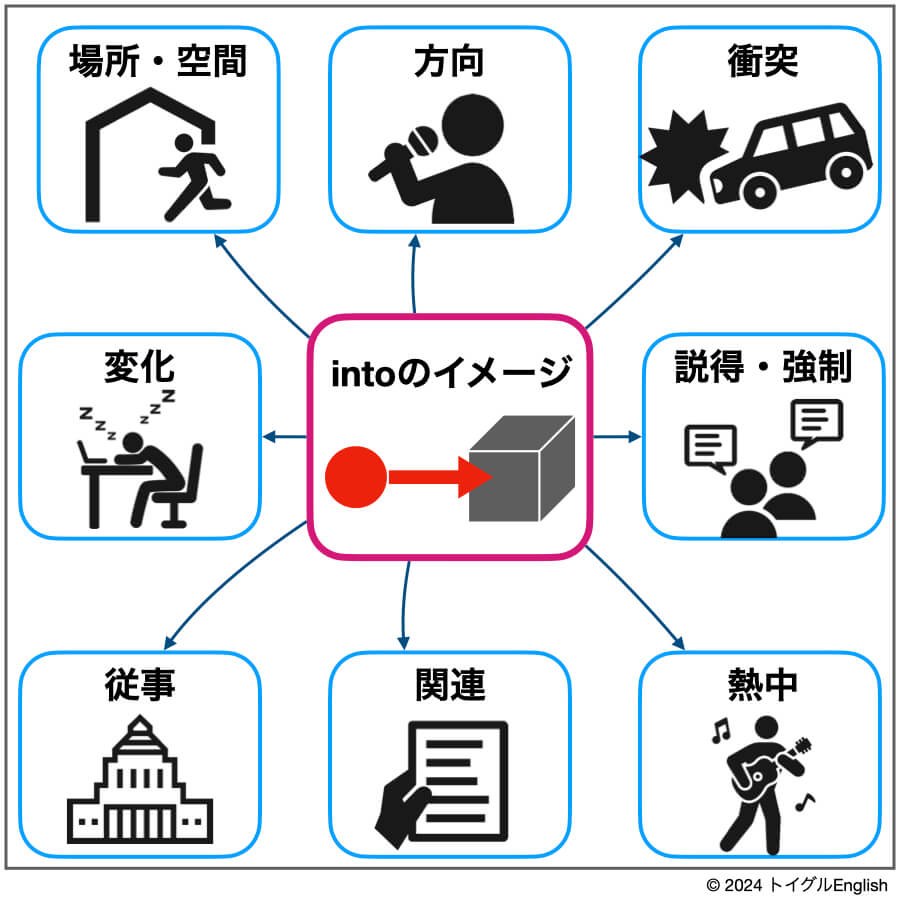英語の into は「…の中へ」の意味で使われる前置詞です。
例: go into the house(家の中へ入る)
into の読み方
into
イントゥ
/ɪ́ntuː/
【into の発音(男性声)】
【into の発音(女性声)】
intoの使い方

into は “in(…の中)+ to(…へ)” から、「人や物が場所・空間へ入っていく」が基本的なイメージです。この意味が比喩的に拡張して、方向、衝突、変化、説得・強制、従事、関連、熱中などの意味で使われます。
1. [場所・空間] …の中へ(に)
- We quickly got into the car.
(私たちは急いで車に乗り込みました)
into は「<場所・空間など> の中へ(に)」の意味で使われます。
建物、部屋、乗物、川、池、海、場所、服、ポケット、ベッド、容器、火などが対象となります。
比喩的な意味で用いられることもあります。
- He walked off into the night.
(彼は夜に向かって歩き出しました)
前置詞 in と into の使い分けには、注意が必要です。
例えば、walk in the park は「公園の中で歩く」ですが、walk into the park は「公園の中に歩いて入る」の意味になります。
また、次の英文を比較してみましょう。
- They jumped in the train.
(彼らは電車に飛び乗った/電車の中でジャンプした) - They jumped into the train.
(彼らは電車に飛び乗った)
出典: English Prepositions Explained
例文(上)は「電車に飛び乗った」と「電車の中でジャンプした」のいずれの解釈も可能です。
一方、例文(下)は「電車に飛び乗った」の解釈になります。
尚、put、throw、drop、fall などの動詞の後では、in と into は同義になります。
- One of the boys fell in the river.
(少年の一人が川に落ちました)
出典: Collins Cobuild English Usage (4th)
また、here や there の前では、in を使用します。
- Come in here.
(ここへおいで) - Put your bags in there.
(そこにカバンを置きなさい)
前置詞 to と into にはニュアンスの違いがあります。
次の例文を比較してみましょう。
- She went to the store.
(彼女はお店に行った) - She walked into the store.
(彼女はお店に入っていった)
例文(上)は前置詞to が使われています。toは <到達> に意味の重点があります。彼女が店の中に入ったかどうかは、意味的にさほど重要ではありません。
一方、例文(下)は前置詞into が使われています。into は <内部へ> の意味に重点があります。そのため、彼女は店の中に歩いて入っていったことが示されます。
into(…の中へ)の反義語は out of(…の外へ)です。
- She stepped out of the car and entered into a store.
(彼女は車を降りて, 店に入りました)
- We need to go into the house.
(私たちは家の中に入る必要があります) - She asked him to come into her room.
(彼女は彼に自分の部屋に来るよう頼みました) - He decided to dive into the pool.
(彼はプールに飛び込むことを決めました) - They walked into the park together.
(彼らは一緒に公園に歩いて入りました) - He put his hand into his pocket.
(彼はポケットに手を入れました) - I got back into bed quickly.
(私は急いでベッドに戻りました) - She poured coffee into the cup.
(彼女はカップにコーヒーを注ぎました) - He threw wood into the fire.
(彼は火に木を投げ入れました)
2. [到着] …に到着して
- We’ll get into London at noon.
(私たちは正午にロンドンに着きます)
into は「<場所に> 到着して」の意味で使われることがあります。
- She got into work early to finish the report.
(彼女は報告書を仕上げるために早めに職場に着きました)
移動の意味で into の代わりに in を使用することはできません。
We got in France after some delay.- We got into France after some delay.
(いくらか遅れた後, フランスに着きました)
3. [混合] …に混ぜて
- She blended the spices into the soup.
(彼女はスパイスをスープに混ぜました)
into は「…に混ぜて」の意味で使われることがあります。
- He mixed the sugar into the coffee.
(彼は砂糖をコーヒーに混ぜました) - Stir the chocolate into the milk.
(チョコレートを牛乳に混ぜてください)
4. [方向] …に向かって
- She spoke into a microphone clearly.
(彼女はマイクに向かってはっきりとしゃべりました)
into は「…に向かって」の意味で使われることがあります。
- He looked up into the sky.
(彼は空を見上げました)
5. [経路] …に通じる
- All the roads into town were closed due to construction.
(町に通じるすべての道は工事のため閉まっています)
intoは「…に通じる」の意味で使われることがあります。
道路・入り口・道などに通じる場合に使われます。
6. [衝突] …にぶつかって
- The car crashed into the fence.
(車はフェンスに衝突しました)
into は「…にぶつかって」の意味で使われることがあります。
比喩的に「(偶然)出会う」の意味で解釈されることもあります。
- He bumped into his old friend at the supermarket.
(彼はスーパーで旧友に偶然出会いました)
- The car plowed into the snowbank.
(車が雪山に突っ込みました) - She accidentally ran into a wall while texting on her phone.
(彼女は携帯電話でテキストメッセージを打っている時, 誤って壁にぶつかってしまいました)
7. [挿入] …に入れて, 通して
- He plugged the charger into the outlet.
(彼は充電器をコンセントに差し込みました)
into は「…に入れて」や「通して」の意味で使われることがあります。
- He paid money into his savings account every month.
(彼は毎月, 普通預金口座に入金していました)
8. [変化] …になって, 変わって
- He fell into a deep sleep.
(彼は深い眠りにつきました)
into は「<ある状態> になって, 変わって」の意味で使われることがあります。
「翻訳する」の意味で使われることがあります。
- He translated the document from French into English.
(彼はその書類をフランス語から英語に翻訳しました)
「<食材を> …にする」の意味で使われることがあります。
- She made flour into bread by mixing it with yeast and water.
(彼女は小麦粉にイーストと水を混ぜてパンを作った)
「<人> にショックを与えて…にさせる」の意味で使われることがあります。
- She was shocked into silence by the unexpected news.
(彼女は予想しないニュースにショックで黙り込んでしまいました)
- The team ran into difficulties when the budget was unexpectedly cut.
(予算が予想外に削減されたとき, チームは困難な状況に陥りました) - He gradually fell into a depression after the breakup.
(彼は別れの後, 徐々に鬱状態に陥りました) - The medical bills caused her to get into debt.
(医療費のせいで彼女は借金を抱えることになりました) - The audience burst into applause at the end of the performance.
(演技の終了時, 観客は拍手喝采を送りました) - The old warehouse was turned into a trendy art gallery.
(古い倉庫はおしゃれなアートギャラリーに改装されました) - The rain gradually changed into snow.
(雨は徐々に雪に変わりました) - The fragile vase fell off the shelf and broke into pieces on the floor.
(壊れやすい花瓶は棚から落ちて床で粉々に割れました) - He put the lyrics into Japanese for the cover song.
(彼はカバー曲のために歌詞を日本語に翻訳しました)
9. [分割] …に分割されて
- She divided the cake into eight equal slices.
(彼女はケーキを8等分にしました)
into は「…に分割されて」の意味で使われることがあります。
- They divided the population into age groups for the survey.
(彼らは調査対象者を年齢層に分けました) - She cut the watermelon into small pieces for the fruit salad.
(彼女はフルーツサラダ用にスイカを小さく切りました)
10. [着替] …に着替えて
- She changed into her pajamas before going to bed.
(彼女は寝る前にパジャマに着替えました)
into は「…に着替えて」の意味で使われることがあります。
- He got into his costume for the play.
(彼は芝居の衣装に着替えました)
11. [説得・強制] …させる
- He tried to talk her into buying the new car.
(彼は彼女を説得して新車を買わせようとしました)
into は「…させる」の意味で使われることがあります。
- He was forced into signing the contract against his will.
(彼は意思に反して契約書にサインさせられました) - She persuaded him into joining the club.
(彼女は彼にそのクラブに入るよう説得しました) - The company lured customers into buying unnecessary products with misleading advertisements.
(その会社は誤解を招くような広告で顧客を誘い, 不必要な商品を買わせました)
12. [時間帯] …まで
- He studied into the night for his exams.
(彼は試験のため, 夜まで勉強していました)
into は「<時間帯> まで」の意味で使われることがあります。
「…が経ったところで」の意味で使われることがあります。
- Just two weeks into his new job, he got a raise.
(新しい仕事を始めてわずか2週間で, 彼は昇給しました)
- She traveled frequently until she was well into her forties.
(彼女は40代になるまで, 頻繁に旅行をしていました) - About four months into training, he ran his first marathon.
(トレーニングを始めて約4ヶ月で, 彼は最初のマラソンを走りました)
13. [事業・活動] …の中へ
- She plans to go into politics after graduation.
(彼女は卒業の後, 政界に入る計画です)
into は「<事業・活動・組織など> の中へ」の意味で使われることがあります。
- They plan to get into the tech business next year.
(彼らは来年, テクノロジービジネスを始める計画です) - He was hesitant to enter into a two-year contract at first.
(彼は当初, 2年契約を結ぶことをためらっていました) - She worked hard to get into college of her choice.
(彼女は自分の選んだ大学に入るため, 一所懸命働きました) - He was born into a wealthy family.
(彼は裕福な家庭に生まれました) - Don’t drag me into your argument.
(あなたたちの口喧嘩に私を巻き込まないでください)
14. [関連] …について
- She promised to look into the matter.
(彼女はその件について調査すると約束しました)
into は「<対象> について」の意味で使われることがあります。
- He didn’t want to go into details about his personal life.
(彼は個人的な生活についての詳細を話したがりませんでした) - She requested an investigation into the safety standards of the workplace.
(彼女は職場の安全基準に関する調査を依頼しました) - He called upon the authorities to conduct an inquiry into the environmental impact.
(彼は当局に環境への影響についての調査を求めました) - The authorities conducted an examination into the safety of the building.
(当局は建物の安全に関する調査を行いました) - They published a paper detailing their research into new materials.
(彼らは新しい材料に関する研究を詳細に述べた論文を公表しました) - The university conducted a study into the effects of social media on mental health.
(大学はソーシャルメディアが精神的健康に与える影響についての研究を行いました) - The book provides valuable insights into the author’s life.
(その本は著者の生活についての貴重な洞察を提供しています)
15. [熱中] …に熱中している, ハマっている
- She’s into cooking these days.
(彼女は最近, 料理にハマっています)
into は「…に熱中している」や「…にハマっている」の意味で使われることがあります。略式体につき、書き言葉には適していません。
いくつかの文献によれば、この用法は1960年代ごろから使われ始めたようです。
- She’s really into playing guitar lately.
(彼女は最近ギターを弾くのにハマっています) - He’s heavily into bodybuilding and spends hours at the gym every day.
(彼はボディビルディングにとてもハマっていて, 毎日何時間もジムで過ごします) - He used to be into playing video games all the time, but now he prefers reading.
(彼は以前はビデオゲームに夢中でしたが, 今は読書が好きです)
16. [除法] …を割って
- 4 into 28 is 7.
(28割る4は7です)
into は「…を割って」の意味で使われることがあります。
17. [借金] …に借金して
- I’m into him for $100.
(彼に100ドル借金しています)
“be into O for 金額” にて、「O<人> にX<金額>の借金がある」の意味で使われます。

